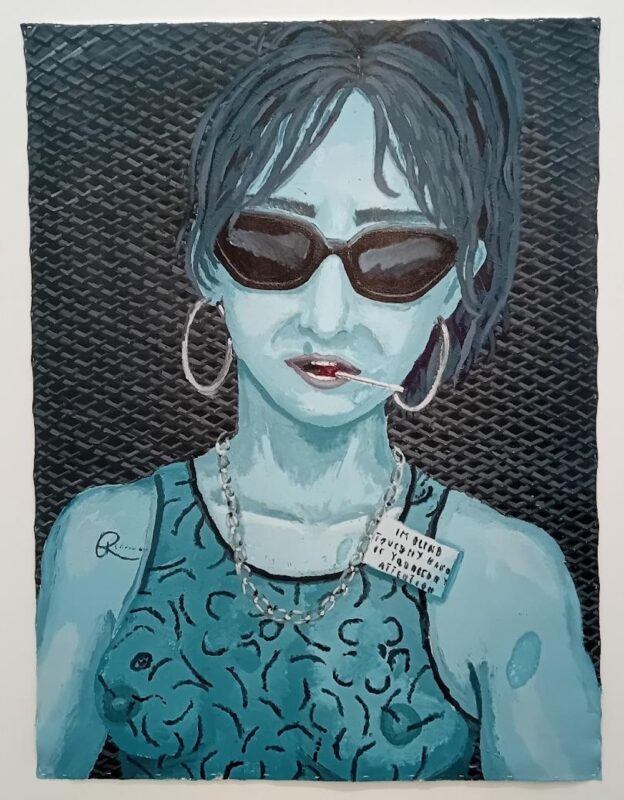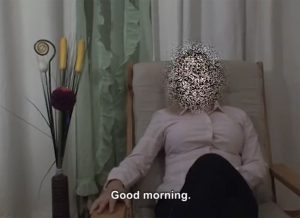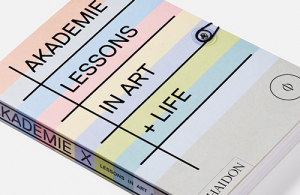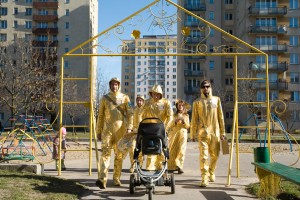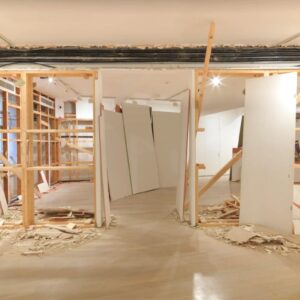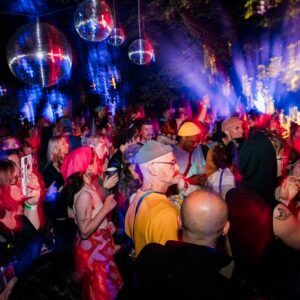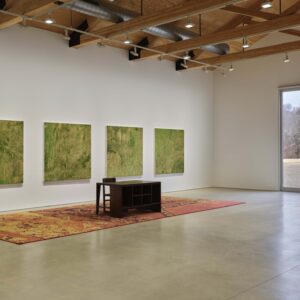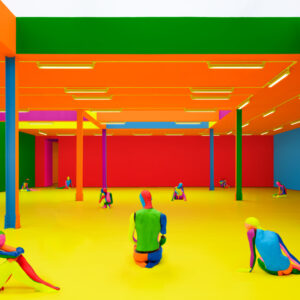The Jencks Foundation presents ‘1980 in Parallax’, an exhibition by New Delhi-based Raqs Media Collective on display from 4th April to December 2023 at The Cosmic House in London.
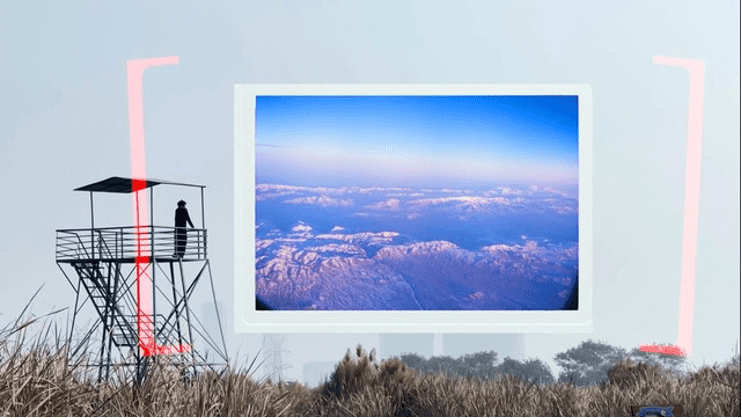
Raqs Media Collective’s work is located at the intersections of contemporary art, historical enquiry, philosophical speculation, research, theory and poetry. It is a hybrid practice and methodology that finds correspondence with Charles Jencks’ work as designer, critic, historian, concrete poet and artist, and with his Post-Modernist manifesto and former home turned Grade I listed museum, The Cosmic House.
Raqs Media Collective said:
The Bicyclist Who Fell into a Time Cone is an investigation into the optics of this specific sensation of time, which has become second nature for us since 1980. It is a time traveling search into and out of a year – that pause between turbulences – a pause that lurks in every year of what we call our long now.
The exhibition ‘1980 in Parallax’ centres around a new commission titled The Bicyclist Who Fell into a Time Cone. It uses the concept of parallax –which describes the changing perception of objects in relation to their background, based on the position and movement of the viewer. The work borrows the term to describe perceptions of a particular moment in history while moving through time, folding time, space, imagery and narrative to interrogate varied geographies of perceived centres and peripheries.
Shot in the derelict and almost moon-like landscapes of New Delhi’s hinterland, places of wilderness in-between and at the edge of other places, The Bicyclist Who Fell into a Time Cone sees Raqs Media Collective experiment with new visual textures achieved through nesting, embedding, and juxtaposing contemporary footage with found archival images, some of which have been sourced from Jencks’ travels in India in the 1980s. This polyphony of visual registers is accompanied by a single voice narration; a monologue about time, memory, and history that lapses between scales of temporality and implies a spectral plurality of time: from mundane present time (the short duration it takes to prepare coffee), through the recent past of the 1980s, to vast cosmic timeframes.
The film’s main protagonist is the figure of the bicyclist whose circular and repetitive journey invokes an explorative and meditative mood. This zooming in and out of time and the temporal ambiguity of the landscapes contemplates abstracted notions of time, mirrored by a set of animated topological shapes and time cones that appear and disappear on screen and enter the physical space of The Cosmic House through Raqs Media Collective’s wall drawings and AR installations entitled Betaal Tareef: In Praise of Off-time (and its Entities).
Eszter Steierhoffer, Artistic Director of the Jencks Foundation at The Cosmic House said:
Raqs Media Collective’s exhibition ‘1980 in Parallax’ oscillates between fact and fiction while describing 1980 as a transient moment that left a significant mark on our collective imaginaries. Sharing an affinity with The Cosmic House – another complex diagram of time – the film invites us to think about temporality and offers a method of ‘kinetic contemplation’ to destabilise mainstream narratives. Raqs Media Collective’s work extends the physical architecture of the house and its potential interpretations.
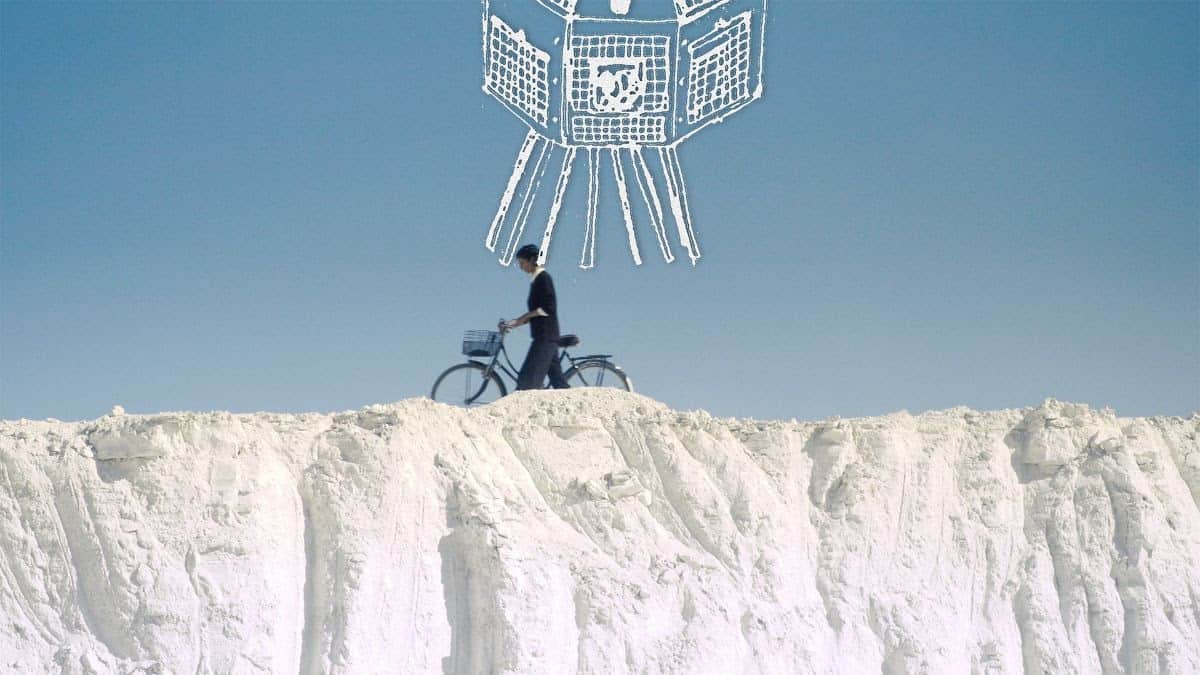
Lily Jencks, Director of the Jencks foundation at The Cosmic House said
Raqs Media Collective’s captivating exhibition reframes our understanding of a key year in the design of The Cosmic House, and Charles’ intellectual work on the first Architectural Biennale in 1980: revealing slippages in time, space and concept, providing us with a richer way think about the Jencks Foundations’ intellectual project as a historical archive in a contemporary institution
1980 IN PARALLAX- A new commission and exhibition by Raqs Media Collective for the Jencks Foundation at The Cosmic House- Previews by appointment from 3rd April 2023
About the artist
Raqs Media Collective was founded in New Delhi in 1992, by Monica Narula, Jeebesh Bagchi and Shuddhabrata Sengupta. The word “raqs” in several languages denotes an intensification of awareness and presence attained by whirling, turning, being in a state of revolution. Raqs take this sense to mean ‘kinetic contemplation’ and a restless and energetic entanglement with the world, and with time. Raqs practices across several media; making installation, sculpture, video, performance, text, lexica, and curation. Their work finds them at the intersection of contemporary art, philosophical speculation and historical enquiry. Most recently, they were the artistic directors of the Yokohama Triennale 2020, “Afterglow” and invited the public to participate in epistemic disobedience with them at “Hungry for Time” at the Academy of Art, Vienna (2021). Their most recent solo exhibition was “The Laughter of Tears” at the Kunstverein Braunschweig (2021).
About the Jencks Foundation & ‘isms and ‘wasms: 1980 in Parallax
The Jencks Foundation acts as a cultural laboratory to promote critical experimentation in the expanded field of architecture through the lens of Post-Modernism. The foundation’s programme builds upon the multivalent legacy of the late writer, critic, designer and teacher Charles Jencks as well as the ideas imbued in The Cosmic House.
The exhibition launches the Jencks Foundation’s first research theme, ‘isms and ‘wasms: 1980 in Parallax, an exercise in re-mapping the year 1980, looking back – once again – in order to look forward and reconsider the Post-Modern canon from the critical distance of 43 years and from ‘parallax’ views. This theme will be developed over the year through seminars, commissions and salons, more details of which will be available on our website.
A moment with momentum, the year 1980 is both an end and a beginning. It marked the transition between key decades, bringing about momentous political and technological shifts of global significance, the reverberations of which we are still living through today. Another beginning and end – often described as ‘the beginning of the end’ – was signalled by the launch of the first ever Venice Architecture Biennale held in 1980. Entitled The Presence of the Past, it famously announced Post-Modernism as the international paradigm of architecture and proposed a new canon that was to be more polyphonic. The same paradigm shaped the ideas and the designs of Charles and Maggie Jencks’ family home, also known as The Cosmic House which was being detailed during this same period.
To learn more about the programme please visit jencksfoundation.org
